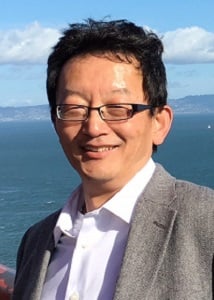About Me
- John A. and Josephine B. Wootton Endowed Chair in Research
- Professor in the Department of Medicine at CWRU
- Professor in Departments of Pharmacology and Physiology and Biophysics
- Member of Case Comprehensive Cancer Center
Bingcheng Wang, PhD, is Director of the Division of Cancer Biology within the Department of Medicine. He was appointed MetroHealth Research Institute Director of Basic Sciences, effective January 4, 2021. As Director, Dr. Wang will further develop basic and translational sciences research at The MetroHealth System (MHS) and guide its continued growth in alignment with System mission and vision.
Dr. Wang received his PhD in Toxicology and Oncology from the University of Wisconsin-Madison where his innovative research on breast cancer led to the award of one of the first three US biotechnology patents. Dr. Wang joined La Jolla Cancer Research Foundation for postdoctoral training where he honed his skills in small peptide-based cancer therapeutics. He joined MetroHealth and Case Western Reserve University (CWRU) School of Medicine in 1997.
Dr. Wang is an internationally-renowned cancer biologist who has many publications in top journals including Cancer Cell, Nature Cell Biology and Science Signaling. His laboratory focuses on how a group of essential cell surface communication molecules called receptor tyrosine kinases controls malignant behavior of cancer cells. His team has made multiple contributions to the field. His laboratory has been continuously funded by the National Institute of Health (NIH), DoD and a number of private foundations. He served as a program leader in the National Cancer Institute-designated Case Comprehensive Cancer for 10 years, first leading the Genitourinary Program and then the Molecular Oncology Program. Nationally he is a regular reviewer for many of the top journals and served for over 20 years on study sections of NIH, DoD, ACS and other agencies and foundations.
Dr. Wang has been the inaugural Director of the Division of Cancer Biology in the Department of Medicine since 2014. Under the new strategic vision of research at MetroHealth, Dr. Wang had a major role in the successful recruitment of four new basic and translational cancer researchers, all of whom are nationally recognized and talented investigators with prestigious grants from NIH.
Dr. Wang is currently Professor in the Department of Medicine at CWRU and holds the John A. and Josephine B. Wootton Endowed Chair in Research. He also holds appointments in Departments of Pharmacology and Physiology and Biophysics and is a member of the Case Comprehensive Cancer Center.
Contact
Call: 216-778-4256 Email: bxw14@case.edu Website: Case Comprehensive Cancer Center Profile
Research in the Wang laboratory focuses on the structure and function of Eph receptor tyrosine kinases in tumor growth and metastasis. The 14 members of Eph kinases are by far the largest subfamily of receptor tyrosine kinases in mammalian system. They interact with the membrane-anchored ligands called ephrins and mediate cell-cell contact signaling.
Over the two decades, the Wang lab has made multiple seminal contributions in unraveling the intricate interplays between Eph kinases and other cell regulatory pathways in controlling tumor etiology and malignant progression. This has led to the elucidation of the dual roles of EphA2 in oncogenesis. In the presence ligands, EphA2 functions as potent tumor suppressor gene by inhibiting PI3K/Akt, Ras/ERK pathways, two of the major drivers of tumor development. In the absence of ligand, EphA2 becomes a target for of Akt and RSK that phosphorylate EphA2 on serine 897, an event that converts EphA2 from a tumor suppressor into an oncogenic protein. Using time-resolved live cell spectrometry, his lab has recently discovered a novel multimeric assembly of EphA2, the first for a receptor tyrosine kinase. Moreover, the intricate organization shed light on the dual function of EphA2.
By serendipity, they discovered that EphA2 is a driver of immune evasion in multiple cancer types, which has led to a multidisciplinary collaborative project to develop small molecules to reactivate immune response for cancer therapy in combination with immune checkpoint blockers and conventional therapies. Research in Wang lab has been continuously funded by NIH, DoD, ACS, and other public and private agencies and John A. and Josephine B. Wootton family.
